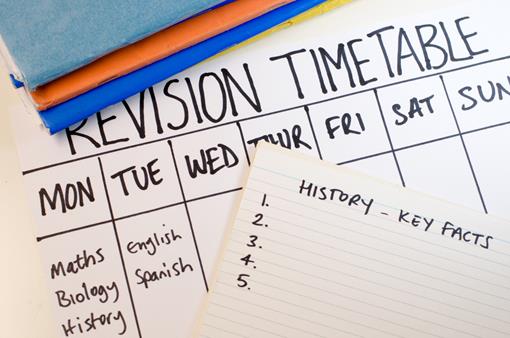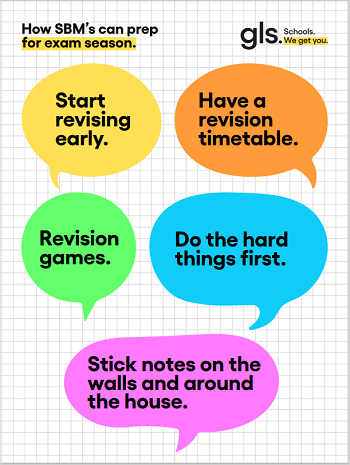How SBM’s can prep for exam season

How SBM’s can prep for exam season
Exam season is soon approaching which means children are going to need assistance and the correct resources to aid them with revision. To ensure that SBM’s cater to each different test, we have created some ways in which SBMs can prep for exam season. This includes advice on differentiating the younger children and the older children. All types of exams are equally as important to further pupils' education and SBM’s should fully prepare their school for them.
Schedule revision sessions
It is important to be organised with time available for revision sessions that pupils can do. To know that your staff are saving plenty of time for their pupils to revise, schedule revision sessions. Review each day's schedule and find opportunities to slot revision into. Create a timetable that you can print out and hand to your staff so then they are informed of when they can do revision sessions with their class.
Brief your staff about the revision sessions and opportunities for after school clubs dedicated to revision. This ensures that your staff understand your plan of action to aid the pupils. They can also then carry out useful revision sessions ensuring that the pupils are fully prepared for their upcoming tests.
Have regular meetings with teachers
Schedule some meetings with your team to lay out a revision plan with them. This is a great opportunity to figure out what your teachers are planning to do to help their pupils too. Discuss everyone’s strategies and find the pros and cons of each one. This way, you can tailor the revision sessions to the age of the children as well as the importance of the test. Also, you can get feedback and opinions on how to best handle the revision period.
These meetings are great for discussing the next steps for older children and how the exam period can prepare them for it. Whether that’s primary school children going into secondary school or children preparing for college, produce a plan to support them. Exams are crucial to move onto the next steps and as a team, you will need to be there for them. It is important to get the best out of the pupils, so they achieve the highest possible grades. This all starts with revision. Pupils must have a balance of lessons and revision as tests are approaching. This will allow them to do their best as they are prepared for the types of tests they will be sitting.
Make sure that your staff are aware of a good balance of revision. Over-revising can lead to information not being taken in and children can feel burnt out. Implementing certain times for revision in school and after that your staff can give to pupils will stop this from occurring.
Organise the exam period
To have a successful revision and exam period SBM’s must be organised themselves before organising the school. Understand what is required for your school during exam season and create a detailed plan of action. This should include any resources the school needs such as exam kits, and how the revision period will work. This will give you an idea on how exams will take place and you can gauge how effective the revision period will be.
Once the exam and revision season has been organised keep your staff informed. Revisit your plan of action regularly and make amends as you go along. It is vital to do this as you can log what is working and what needs changing to keep the revision and exam periods running smoothly. Have regular updates with your staff so they know what to enforce. Also, take into consideration any teacher feedback that has been received as they are the ones assisting the pupils with their revision. Your teachers will be able to update you on any sessions that are not working or if any resources are not suitable.
Help with encouraging parents to carry on revision outside of school through letters or organising parent teacher meetings. This keeps parents updated on the school's strategy and ensure children will have enough time to revise before exams.
Create feedback reports
The best way to ensure that the revision period runs as smooth as possible, is by compiling feedback. Children will confide in their teachers through stressful times and often feedback on what is not working well for them. This can be through asking for help as they are struggling with a certain subject. Let your staff know that it is best to report all feedback or issues the pupils are experiencing. Have them send any logged feedback to you so you can review the revision strategy and know what areas can be improved on for future reference.
The teachers will implement changes themselves tailored to the specific pupil, but it is important for an SBM to know what the pupils feel about how the school is tackling revision.

Create revision techniques
As an SBM it is vital to make sure that teachers are doing everything they possibly can to assist pupils. Although it is up to your staff to plan revision techniques to use for their class, you can assist them. Give a small list of techniques for teachers to implement. This will ensure that the techniques used throughout the school are consistent. Teachers can then tweak these techniques for different exams and ages.
Expect your staff to have some revision techniques as it is up to them but going the extra mile allows all of them to know the standards of the school. Plus, children will excel with a wide range of different revision techniques because some will work while others won’t depending on the individual.
Here are a few ideas of revision techniques that your staff can use:
1) Use revision cards to allow information to be remembered and then quiz the pupils on the cards. Doing this lets children attempt to get an exam question correct as well as remembering key information. Stock up on revision cards for your school so everyone can use them.
2) Note-taking is essential for children to remember key information. Suggest that teachers ensure there’s a column next to the notes for the important information, so it is easier for the pupils to find the answer. Using guide cards is also a great way to have the key information available and easy to find. Ensure you purchase some guide card boxes too so they can be stored safely in classrooms.
3) A great way to remember answers to a question is through conversation. Let your staff know that it is good for children to take a break from writing answers down. They can let pupils talk about a subject to the rest of the class for a few minutes. This works well as it allows pupils to understand what they already know on the topic.
4) Another way that shows your staff what pupils already know in preparation for exams is by allowing them to teach each other. They can assist each other about exam topics and learn areas they struggle with from their peer's knowledge. Purchase resources that can be used to assist pupils with their revision and teaching each other such as revision books.
5) Create a ranking system for teachers to give out in class. This will allow pupils to rank their knowledge in certain areas which will flag any knowledge gaps. This can be done throughout the revision season as often as possible to gauge how well the revision strategy is working. Ensure that teacher's feedback to you, so you can keep track of the success and if any changes need implementing for the future.
6) Compile plenty of past tests to give to your staff. This must be in line with the test they are due to sit, and they need to be consistent around the school. It is best for an SBM to sort this out for this reason rather than have multiple teachers getting different past exams. This way you have control of what each class are practicing on, and you can check if it relates to their upcoming exam.
Further guidance- Download worksheet
For more useful information on how you can prep for exam season, have a look at our worksheet. Print this out and display them across the school so pupils can have revision advice in accessible places. You can even leave them in the staff room for teachers to take for their class or for themselves as inspiration for new revision techniques to implement.




